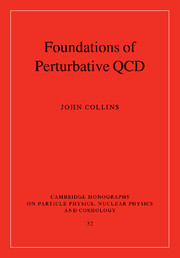Book contents
- Frontmatter
- Contents
- Dedication
- Acknowledgments
- 1 Introduction
- 2 Why QCD?
- 3 Basics of QCD
- 4 Infra-red safety and non-safety
- 5 Libby-Sterman analysis and power-counting
- 6 Parton model to parton theory: simple model theories
- 7 Parton theory: further developments
- 8 Factorization for DIS, mostly in simple field theories
- 9 Corrections to the parton model in QCD
- 10 Factorization and subtractions
- 11 DIS and related processes in QCD
- 12 Fragmentation functions: e+e- annihilation to hadrons, and SIDIS
- 13 TMD factorization
- 14 Inclusive processes in hadron-hadron collisions
- 15 Introduction to more advanced topics
- Appendix A Notations, conventions, standard mathematical results
- Appendix B Light-front coordinates, rapidity, etc.
- Appendix C Summary of primary results
- References
- Index
11 - DIS and related processes in QCD
Published online by Cambridge University Press: 16 May 2011
- Frontmatter
- Contents
- Dedication
- Acknowledgments
- 1 Introduction
- 2 Why QCD?
- 3 Basics of QCD
- 4 Infra-red safety and non-safety
- 5 Libby-Sterman analysis and power-counting
- 6 Parton model to parton theory: simple model theories
- 7 Parton theory: further developments
- 8 Factorization for DIS, mostly in simple field theories
- 9 Corrections to the parton model in QCD
- 10 Factorization and subtractions
- 11 DIS and related processes in QCD
- 12 Fragmentation functions: e+e- annihilation to hadrons, and SIDIS
- 13 TMD factorization
- 14 Inclusive processes in hadron-hadron collisions
- 15 Introduction to more advanced topics
- Appendix A Notations, conventions, standard mathematical results
- Appendix B Light-front coordinates, rapidity, etc.
- Appendix C Summary of primary results
- References
- Index
Summary
In this chapter we complete our treatment of inclusive structure functions for DIS in QCD. Our analysis so far started with the parton model, and we generalized it to a factorization property, for which we found a complete proof in a non-gauge theory in Sec. 8.9. We then formulated factorization in QCD (without a proof), using gauge-invariant definitions of parton densities from Sec. 7.6. This enabled us to make low-order calculations of the perturbative hard-scattering coefficients in Ch. 9
The methods of Ch. 10 allow us to complete the work for QCD. Compared with a non-gauge theory, there is no change in the form of factorization, i.e., (8.81) and (8.83). The DGLAP evolution equations, associated with the renormalization of parton densities, are also unchanged in structure.
One change in QCD is that the operators defining the parton densities acquire Wilson lines; we also need to justify the form of the gluon density. For the proof, the enhancements relative to Sec. 8.9 are caused by the extra gluons joining the hard and collinear subgraphs in leading regions. We need generalization beyond the related work in Ch. 10 because the gauge group of QCD is non-abelian. The subtractions in the hard scattering are more complicated than those with the ladder structures appropriate to a non-gauge theory. Finally, in generalizing DIS to an off-shell Green function instead of an on-shell matrix element, we need extra parton-density-like quantities involving gauge-variant operators.
- Type
- Chapter
- Information
- Foundations of Perturbative QCD , pp. 398 - 425Publisher: Cambridge University PressPrint publication year: 2011



